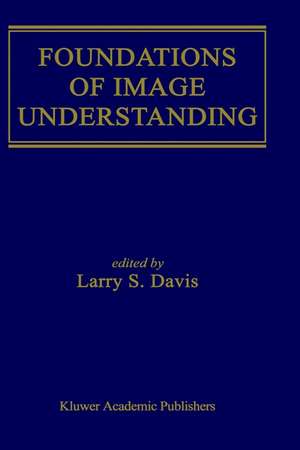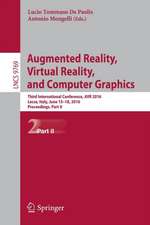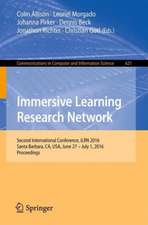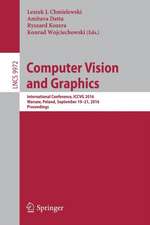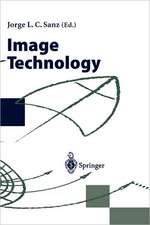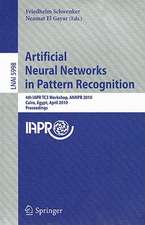Foundations of Image Understanding: The Springer International Series in Engineering and Computer Science, cartea 628
Editat de Larry S. Davisen Limba Engleză Hardback – 31 aug 2001
Each chapter of Foundations of Image Understanding is written by one of the world's leading experts in his area of specialization, examining digital geometry and topology (early research which laid the foundations for many industrial machine vision systems), edge detection and segmentation (fundamental to systems that analyze complex images of our three-dimensional world), multi-resolution and variable resolution representations for images and maps, parallel algorithms and systems for image analysis, and the importance of human psychophysical studies of vision to the design of computer vision systems. Professor Rosenfeld's chapter briefly discusses topics not covered in the contributed chapters, providing a personal, historical perspective on the development of the field of image understanding.
Foundations of Image Understanding is an excellent source of basic material for both graduate students entering the field and established researchers who require a compact source for many of the foundational topics in image analysis.
| Toate formatele și edițiile | Preț | Express |
|---|---|---|
| Paperback (1) | 997.56 lei 6-8 săpt. | |
| Springer Us – 28 oct 2012 | 997.56 lei 6-8 săpt. | |
| Hardback (1) | 1004.16 lei 6-8 săpt. | |
| Springer Us – 31 aug 2001 | 1004.16 lei 6-8 săpt. |
Din seria The Springer International Series in Engineering and Computer Science
- 24%
 Preț: 1041.98 lei
Preț: 1041.98 lei - 20%
 Preț: 643.50 lei
Preț: 643.50 lei - 18%
 Preț: 1225.62 lei
Preț: 1225.62 lei - 18%
 Preț: 965.02 lei
Preț: 965.02 lei - 20%
 Preț: 646.12 lei
Preț: 646.12 lei - 18%
 Preț: 948.79 lei
Preț: 948.79 lei - 20%
 Preț: 646.62 lei
Preț: 646.62 lei - 15%
 Preț: 637.46 lei
Preț: 637.46 lei - 20%
 Preț: 643.83 lei
Preț: 643.83 lei - 18%
 Preț: 949.23 lei
Preț: 949.23 lei - 20%
 Preț: 644.48 lei
Preț: 644.48 lei - 20%
 Preț: 994.92 lei
Preț: 994.92 lei - 20%
 Preț: 645.97 lei
Preț: 645.97 lei - 18%
 Preț: 946.87 lei
Preț: 946.87 lei - 20%
 Preț: 995.57 lei
Preț: 995.57 lei - 18%
 Preț: 956.99 lei
Preț: 956.99 lei - 20%
 Preț: 644.98 lei
Preț: 644.98 lei - 15%
 Preț: 649.54 lei
Preț: 649.54 lei - 18%
 Preț: 950.21 lei
Preț: 950.21 lei - 18%
 Preț: 1221.38 lei
Preț: 1221.38 lei - 18%
 Preț: 957.62 lei
Preț: 957.62 lei - 15%
 Preț: 643.99 lei
Preț: 643.99 lei - 18%
 Preț: 948.47 lei
Preț: 948.47 lei - 18%
 Preț: 947.35 lei
Preț: 947.35 lei - 20%
 Preț: 1284.65 lei
Preț: 1284.65 lei - 20%
 Preț: 1628.31 lei
Preț: 1628.31 lei - 20%
 Preț: 1285.78 lei
Preț: 1285.78 lei
Preț: 1004.16 lei
Preț vechi: 1255.19 lei
-20% Nou
Puncte Express: 1506
Preț estimativ în valută:
192.14€ • 200.63$ • 158.67£
192.14€ • 200.63$ • 158.67£
Carte tipărită la comandă
Livrare economică 15-29 aprilie
Preluare comenzi: 021 569.72.76
Specificații
ISBN-13: 9780792374572
ISBN-10: 0792374576
Pagini: 492
Ilustrații: XV, 492 p.
Dimensiuni: 155 x 235 x 29 mm
Greutate: 0.89 kg
Ediția:2001
Editura: Springer Us
Colecția Springer
Seria The Springer International Series in Engineering and Computer Science
Locul publicării:New York, NY, United States
ISBN-10: 0792374576
Pagini: 492
Ilustrații: XV, 492 p.
Dimensiuni: 155 x 235 x 29 mm
Greutate: 0.89 kg
Ediția:2001
Editura: Springer Us
Colecția Springer
Seria The Springer International Series in Engineering and Computer Science
Locul publicării:New York, NY, United States
Public țintă
ResearchCuprins
1 Summation.- 1. Beginnings.- 2. Bibliographies, books, surveys, and position papers.- 3. Geometry.- 4. Texture analysis, segmentation, and feature detection.- 5. Other topics.- 2 Digital Geometry — The Birth of a New Discipline.- 1. Introduction.- 2. Three classic papers by A. Rosenfeld and J. L. Pfaltz.- 3. Traditional digital geometry.- 4. Digitized Euclidean geometry.- 5. Approximation of curves.- 6. Approximation of surfaces.- 7. Conclusions.- 3 Digital Topology.- 1. Introduction.- 2. The discrete Jordan curve theorem.- 3. Good pairs of adjacency relations.- 4. Simple points.- 5. Adjacency trees; boundary and border following algorithms.- 6. Concluding remarks.- 4 Fuzzy Mathematics.- 1. Introduction.- 2. Geometry.- 3. Digital topology.- 4. Graph theory.- 5. Algebra.- 5 Picture Languages.- 1. Introduction.- 2. Formal languages for pictorial pattern recognition.- 3. 2D and 3D array grammars and array languages.- 4. Parallel grammars and parallel acceptors.- 5. Web grammars, web automata, and cellular graph automata.- 6. An application of array grammars.- 7. Further topics.- 8. List of Rosenfeld’s works on picture languages.- 6 Parallel Image Processing.- 1. Introduction.- 2. Parallel computers for image processing.- 3. Pixel-level processing.- 4. Region-level processing.- 5. Concluding remarks.- 7 Object Representations.- 1. Introduction.- 2. Unit-size cells.- 3. Blocks.- 4. Arbitrary objects.- 5. Hierarchical representations.- 6. Boundary-based representations.- 7. Concluding remarks.- 8 Texture Classification and Segmentation.- 1. Tribulations.- 2. Triumphs.- 3. Tributes.- 9 Edge Measures Using Similarity Regions.- 1. Introduction.- 2. Related work.- 3. Edges and similarity regions.- 4. SRS-based edge measures.- 5. Preprocessing using clustering.- 6. Discussionand conclusions.- 10 Relaxation Labeling: 25 Years and Still Iterating.- 1. Introduction.- 2. Historical remarks.- 3. Tangent maps and compatibilities for curve inference.- 4. Subtree isomorphism for shape matching.- 5. Polymatrix games.- 6. Summary and conclusions.- 11 From a Robust Hierarchy to a Hierarchy of Robustness.- 1. Inside image pyramids.- 2. Stochastic pyramids and least median of squares.- 3. The vision perspective of robustness.- 4. Instead of conclusions.- 12 A Pyramid Framework for Real-Time Computer Vision.- 1. Introduction.- 2. From human to computer vision.- 3. Pyramid transforms.- 4. Frame-to-frame alignment.- 5. Space/time filters.- 6. Multi-resolution fusion.- 7. Displacement fields.- 8. Attribute maps.- 9. Vision front-end system.- 10. Next steps.- 13 On the Computational Modeling of Human Vision.- 1. Introduction.- 2. One-stage theories.- 3. Multiple processes: Perception of lightness.- 4. Multiple representations: Visual segregation.- 5. Multiple sources of information: Perception of transparency.- 6. Impenetrability.- 7. Summary.- 14 Statistics Explains Geometrical Optical Illusions.- 1. Introduction.- 2. Errors in gray values.- 3. Errors in line elements.- 4. Errors in motion.- 5. The inherent problem.- 6. Discussion and summary.- Appendix: Expected value of the least squares solution.- 15 Optics for OmniStereo Imaging.- 1. Introduction.- 2. Circular projections.- 3. OmniStereo mosaicking.- 4. Curves for OmniStereo optics.- 5. Spiral mirror, I.- 6. Spiral mirror, II.- 7. A spiral lens.- 8. Concluding remarks.- 16 Volumetric Scene Reconstruction from Multiple Views.- 1. Introduction.- 2. Volumetric representations.- 3. Shape from silhouettes.- 4. Shape from photo-consistency.- 5. Voxel visibility using plane-sweep.- 6. Voxel coloring.- 7. Space carving.- 8. Better reconstructions.- 9. Extensions.- 10. Conclusions.
